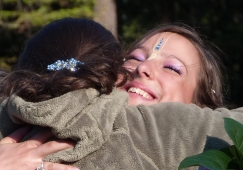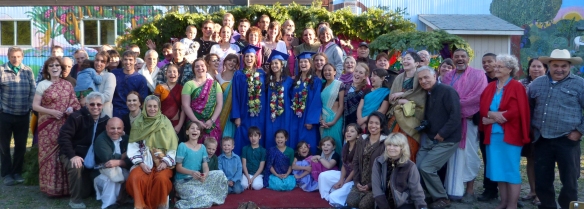Last Saturday here at Sharanagati Village in British Columbia, we had a ceremony for the three students who graduated from our small, K-12 school. All the village parents, children, friends, community members, teachers, and former teachers attended. Many spoke at the event.
Ms. Cummings said, “I’ve been teaching for nineteen years, and that one year some eight years ago when I taught at the Sharanagati school remains my best teaching year. I don’t expect that to change in my teaching career; my year here will remain my best year.”
 Gopal Fournier, one of the graduates, said “At first I didn’t want to be emotional at this time, but then I realized when I see all of you, the beautiful people who have sheltered, supported, encouraged, and loved me my whole life, I couldn’t help but be emotional from the gratitude and love I feel for each one of you.”
Gopal Fournier, one of the graduates, said “At first I didn’t want to be emotional at this time, but then I realized when I see all of you, the beautiful people who have sheltered, supported, encouraged, and loved me my whole life, I couldn’t help but be emotional from the gratitude and love I feel for each one of you.”
Afterwards, some of the teachers and I talked about how small village schools are healthy for both students—who, with their friends, are nurtured close to home—and the community—which is infused with the youthful energy of their own children. Students at our Sharanagati school are happy, which means discipline problems are virtually unknown and academic achievement is often high. Schools like ours aren’t experimental but were the norm a century ago.
I also considered that for those who accept the idea of reincarnation, high school graduation, which marks the end of childhood and beginning of adulthood, is a bit like death: it means stepping out of one stage and into another—it’s a change of bodies. In the words of the Bhagavad-gita:
“As the embodied soul continuously passes, in this body, from childhood to youth to old age, the soul similarly passes into another body at death. A sober person is not bewildered by such a change.”

